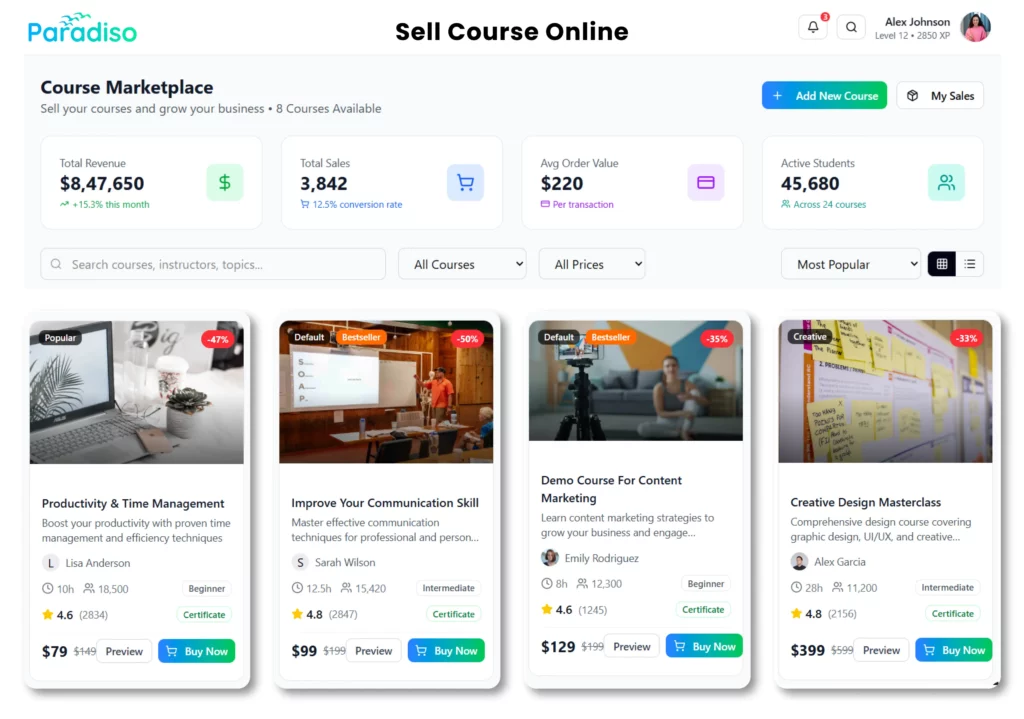Digital marketing is an essential component of e-learning, enabling educational institutions and online learning platforms to reach and engage with learners effectively. As we step into 2023, several exciting trends are reshaping the digital marketing landscape in the e-learning industry.
In this blog post, we will explore the top 15 latest and emerging digital marketing trends set to impact e-learning in 2023.
Microlearning for Bite-Sized Education:
Microlearning, characterized by short and focused learning nuggets, is gaining popularity in e-learning. Marketers are leveraging microlearning to create engaging and easily digestible content that meets the learners’ needs for on-the-go and just-in-time learning.
Personalization through Adaptive Learning:
Adaptive learning uses data-driven algorithms to tailor learning experiences based on learners’ strengths, weaknesses, and preferences. Marketers are employing personalization techniques to deliver customized content, adaptive assessments, and personalized learning paths to enhance learner engagement and outcomes.
Gamification for Enhanced Engagement:
Gamification elements, such as points, badges, leaderboards, and rewards, are being integrated into e-learning platforms to increase learner motivation and engagement. Marketers are leveraging gamification to create interactive learning experiences and foster healthy competition among learners.
Social Learning Communities:
Online communities and social learning platforms are gaining momentum as learners seek peer-to-peer interactions and collaborative learning experiences. Marketers are leveraging these communities to facilitate discussions, knowledge sharing, and networking, creating a sense of belonging and enhancing learner engagement.
Video-based Learning Experiences:
Video content is an effective medium for delivering engaging and visually appealing educational material. Marketers are investing in high-quality video production to create captivating learning experiences, including tutorials, lectures, and demonstrations, to enhance learner comprehension and retention.
Influencer Partnerships in Education:
Influencer marketing is not limited to commercial products. Marketers are partnering with influential educators and subject matter experts to create valuable content, increase brand visibility, and reach wider audiences. These collaborations lend credibility and authenticity to e-learning initiatives.
SEO and Content Optimization for Discoverability:
With the abundance of online e-learning resources, marketers focus on search engine optimization (SEO) to ensure their content ranks higher in search results. Optimized content, relevant keywords, and metadata tags help improve discoverability and attract organic traffic.
Mobile Learning and Responsive Design:
As mobile usage continues to rise, marketers optimise e-learning platforms and mobile device content. Responsive design ensures that learning materials adapt seamlessly to different screen sizes, allowing learners to access educational content anytime, anywhere, and on any device.
Virtual Reality (VR) and Augmented Reality (AR) Integration:
VR and AR technologies offer immersive learning experiences by simulating real-world environments and overlaying virtual elements. Marketers are utilizing VR and AR to create interactive simulations, virtual laboratories, and augmented textbooks, enhancing learner engagement and understanding.
Data Analytics for Personalized Insights:
Data analytics plays a crucial role in e-learning marketing. Marketers are utilizing advanced analytics tools to gather learner data, track progress, identify knowledge gaps, and provide personalized recommendations. These insights help optimize learning experiences and tailor marketing strategies.
Automation for Streamlined Marketing Processes:
Marketing automation tools are revolutionizing e-learning marketing by streamlining repetitive tasks like email campaigns, lead nurturing, and data management. Marketers can focus more on strategic planning and personalized engagement, improving efficiency and scalability.
Chatbots for Instant Support:
Chatbots provide immediate support and guidance to learners, addressing their queries and providing personalized recommendations. Marketers are integrating chatbots into e-learning platforms to enhance learner experience, provide timely assistance, and collect valuable user data for further optimization.
Social Media Advertising and Influencer Outreach:
Social media platforms offer extensive targeting options and advertising capabilities. Marketers are utilizing social media ads to reach specific learner demographics and partnering with influencers in the education space to promote e-learning courses and programs.
Interactive Assessments and Feedback Mechanisms:
Traditional assessments are evolving into interactive formats like quizzes, polls, and simulations to provide real-time feedback and foster active learning. Marketers are leveraging these interactive assessment tools to engage learners and gauge their progress accurately.
Blockchain for Credentialing and Verification:
Blockchain technology is gaining traction in e-learning to secure credentialing and verify learner achievements. Marketers are exploring blockchain-based platforms to issue digital certificates, badges, and degrees, providing learners with verified credentials.
Conclusion:
In 2023, e-learning marketers will have a myriad of digital marketing trends at their disposal to engage learners effectively and drive educational outcomes. From personalized and adaptive learning experiences to immersive technologies and social communities, the e-learning landscape is evolving rapidly, empowering learners to acquire knowledge and skills in innovative ways. By embracing these top 15 digital marketing trends, e-learning providers can stay ahead of the curve and deliver impactful educational experiences in the digital era.











